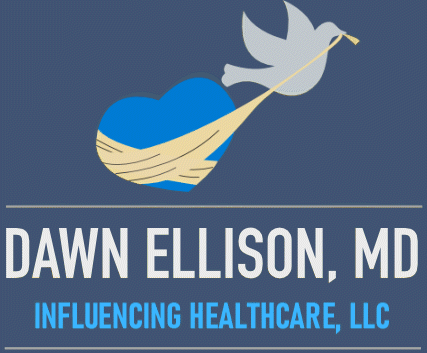Shining Light on the Dark Side of Our Super Powers
Achievement, Perfectionism and Decisiveness
I have met some pretty incredible people in my career both as an Emergency physician and as a professional coach. I’ve noticed patterns of behavior that deserve consideration. Some of the very strengths of character that ‘got us where we are today’ also are holding us back from achieving work-life integration. The good news is they can be overcome!
Achievement
Physicians are achievers. They get into medical school because they achieve good grades in high school and college. Once they decide they want to become doctors, their grit gets them through the hurdles to meet the expectations of the med school admissions committee, boards and applications to residency programs. They may excel as a dancer or clarinetist and ace Calculus, Chemistry and Physics; using both hemispheres of their brain to succeed.
Their extracurricular activities in high school and college are practically unbelievable, yet accurate. The milestones are clear and their tenacity insures they will pass them. They arrive in their planned occupation well prepared to do the work.
But that drive to achieve doesn’t go away. Many of us are left with a longing for more. What is next? It is difficult for us to be ok with just the position we have trained for. There is no clear path to advancement and it is not clear that we should advance. Yet, the drive exists. Meeting excellent productivity and patient satisfaction scores seldom does much to satisfy this hunger for more.
I find that the challenge is that achievers are constantly looking to and living in the future and haven’t learned to appreciate the present. Do you know someone like this? The skill of being in the present is one that avoids regretting the past and worrying about the future. People who can do this are happier humans. When looking forward to achieving the dream is no longer ahead, we would do well to appreciate what is right in front of us.
Perfectionism
Many physicians want to do everything for everyone, everytime. This is admirable and perfectionism has been rewarded with high praise, good grades and high achievement throughout their climb to success.
These physicians find themselves in a system that is not equipped to take care of all the needs of every patient in a timely fashion. The perfectionists do tasks that they are overqualified for, because staff either is ill-equipped or doesn’t have time. The expectations the perfectionists have for themselves, often extends to expecting perfection from the other healthcare workers. When they don’t find this same devotion to perfection, it can be frustrating. This frustration may lead them to actions that do not endear them to their team. They are passionate about good patient care, but are viewed as being difficult to approach. This is an attribute they are often shocked to realize they have , and once they recognize it, one they wish to overcome.
Perfectionism in charting is another woe that results in way too much ‘pajama time’. A term the industry attributes to the many hours physicians spend completing charts and emptying Inboxes after hours. This obsession pulls physicians away from family activities and is poorly rewarded by the system. The perfectionist values a good note; one that is comprehensive and helpful for the patient and consultants. The solution to pajama time is multifactorial. Certainly, efficiency of documentation plays a role. Your EHR can make a difference once you learn to use it well.
The effectiveness of the patient interaction is key as well. For example, agenda setting is crucial especially in primary care. You cannot possibly do everything for everyone, everytime. Setting expectations of what you can accomplish in the beginning of a clinic visit can give you the time you need to complete the note in real time. Often it is important for physicians to consider defining and accepting what documentation is good enough and set boundaries on the use of their time for nonclinical tasks. Sometimes this involves trusting others to do their jobs adequately and not necessarily perfectly.
The essence of overcoming perfectionism is finding an acceptable quality of work, so that you can maintain your sanity, while we work to improve the system. Together, working collaboratively, we can improve the healthcare system so that we take good care of patients and ourselves.
Decisiveness
Decisiveness is rewarded in school and in medical practice. We are trained to present patients with confidence in front of our peers and mentors. Anything less than a concise, decisive presentation risks embarrassment and public correction. In emergencies decisiveness coupled with knowledge drives good care of patients.
The rewarded decisive physician builds that decisive pathway in their brain. Humans already make judgements about people they meet in nanoseconds. Trustworthy, untrustworthy? Likeable, deplorable? The cave man survived because he could avoid danger this way.
When thrown into a meeting in which solutions to problems are sought, the decisive physician is challenged to consider diverse perspectives. Their certainty of their correct solution is solid. They may dominate the meetings because of their certainty. When their solution is questioned by others, they may not be able to imagine another alternative and this is frustrating. Meetings become ‘a waste of time’ and they choose to no longer collaborate.
When we remain engaged in solutions to healthcare issues with an open mind, we will discover the importance of diverse perspectives and begin to see the elephant described by seven blind men of the ancient parable. Decisiveness, needs to be tempered with curiosity and wonder to make the most wise decisions. It is crucial that we lead these decisions and collaborate with our interdisciplinary teams. Using participative practices and having meaningful conversations with stakeholders are key to wise decisions in healthcare.
Make the Most of Your Meetings with Professional Coaching
It is possible to create an environment that thrives on the communication and effectiveness of your healthcare team. The first step starts with a willingness to learn and grow through the process.
To learn more about coaching opportunities, online workshops, and other ways you can illuminate the dark side of your superpowers, explore my website at dawnellisonmd.com. (Hint: you’re on it!)
You can also subscribe to my quarterly newsletter. I promise you won’t be bombarded with emails!
Here are some other articles you may enjoy reading
Why Group Decision Making is Key
Trust in one another is the necessary foundation for group discussions that result in making wise decisions.
A Participative Process is Worth the Effort
Through the spirit of collaboration, optimal health and wellness can be achieved by communicating with patients, families, communities, and other members of the healthcare team.
How We Communicate With Our Peers
Communication is integral to providing excellent patient care. Read about common communication missteps and how to address them.






